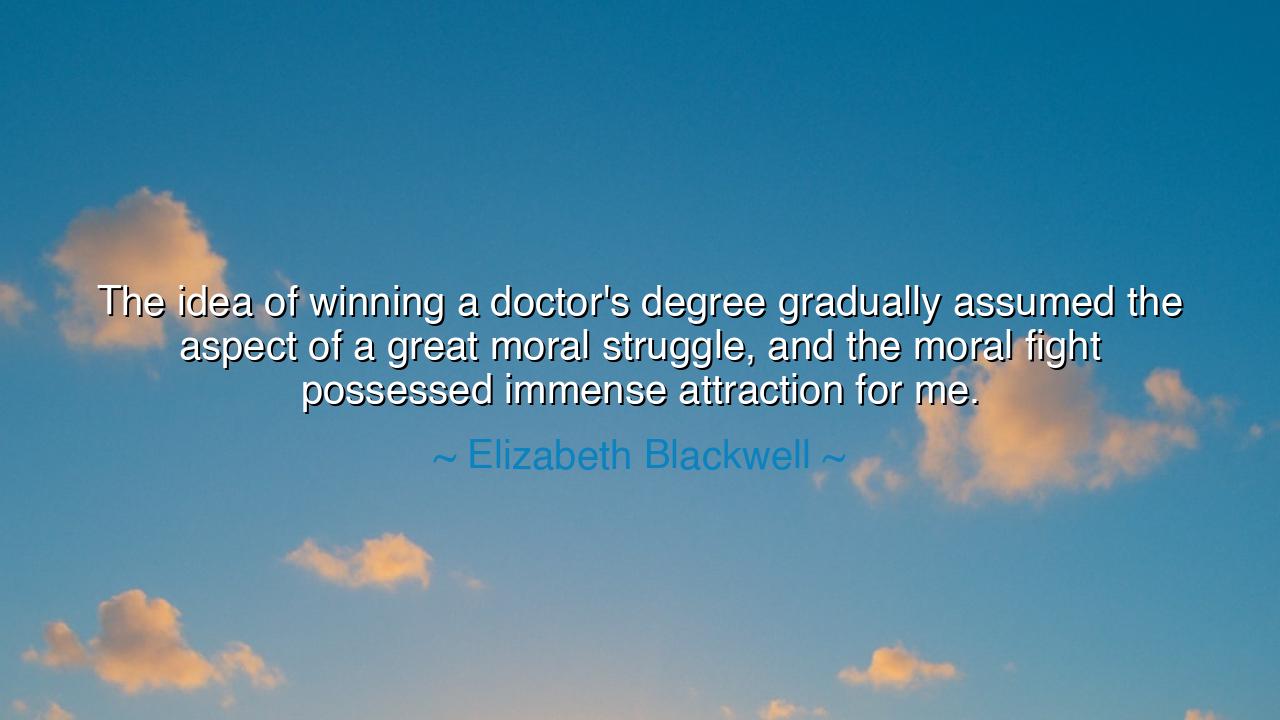
The idea of winning a doctor's degree gradually assumed the
The idea of winning a doctor's degree gradually assumed the aspect of a great moral struggle, and the moral fight possessed immense attraction for me.






The words of Elizabeth Blackwell — “The idea of winning a doctor's degree gradually assumed the aspect of a great moral struggle, and the moral fight possessed immense attraction for me.” — burn with the light of purpose and conviction. They are not merely the reflection of a scholar upon her studies, but the proclamation of a warrior upon her battlefield. For in her time, to become a doctor was not simply to master the science of healing; it was to defy a world that denied women the right to knowledge, dignity, and equality. Her pursuit of the degree was more than academic — it became a moral crusade, a contest between the spirit of progress and the chains of prejudice.
Born in the nineteenth century, Elizabeth Blackwell stood at the threshold of a new age, one where the voice of women began, at last, to rise against centuries of silence. Yet when she declared her intention to study medicine, she was met not with encouragement, but with ridicule. The idea of a woman becoming a physician was treated as folly, even blasphemy. But in her heart, the challenge transformed from ambition to duty. She no longer sought the degree merely for herself, but as a symbol — proof that principle could triumph over limitation, that truth was stronger than custom. The struggle became sacred; the pursuit of education, an act of justice.
Her words echo the timeless spirit of those who have turned obstacles into offerings. She understood, as all great souls do, that resistance refines the will. What began as a dream hardened into resolve, and resolve became destiny. In calling her journey a “moral struggle,” she revealed the depth of her purpose: that every step toward her degree was a blow against ignorance and exclusion. Her fight was not just for her own mind, but for the minds of countless women who would come after her, longing to learn, to serve, to heal. And so, she bore the weight of two battles — one for knowledge, and one for justice.
In this, her story recalls the heroism of Antigone, the ancient Greek maiden who stood against the laws of her king to honor the higher laws of the soul. Like Antigone, Blackwell defied the boundaries of her society, guided not by rebellion for its own sake, but by reverence for what was right. Her struggle was not waged with swords or banners, but with patience, intellect, and endurance. She studied when the world scorned her. She endured insults that would have broken lesser spirits. And in 1849, she emerged triumphant — the first woman in the history of the United States to earn a medical degree, a victory not of privilege, but of courage sanctified by purpose.
But her triumph was not the end of her struggle. It was the beginning of a greater fight — to open doors for others, to create hospitals and institutions where women could study and practice medicine with dignity. Her moral strength lay not in conquest, but in compassion. She healed the sick, but she also healed the soul of a nation, reminding it that progress is not measured in inventions or wealth, but in the liberation of the human spirit. To her, the act of learning was sacred because it was tied to the act of serving. Her moral fight was not against others, but against the darkness of indifference and inequality.
In her example, there is a lesson for every seeker of truth: that education is not only a privilege but a responsibility. To pursue knowledge for self alone is to gather stones; to pursue it for the good of others is to build temples. The moral struggle that Blackwell embraced still calls to us — for in every age, there are barriers yet unbroken, injustices yet unnamed, and voices yet unheard. The courage she showed is not confined to medicine; it belongs to every field where the human conscience must stand against complacency and fear.
So let this be the teaching, O listener: seek not the easy path, but the righteous one. When life demands that you choose between comfort and conscience, remember Blackwell’s example — that true victory lies not in achievement alone, but in the integrity with which it is earned. Every worthy goal demands struggle, and every struggle, if born of love and justice, becomes a sacred act. Let your ambition be joined to compassion, your intellect to purpose, your progress to service.
For in the end, Elizabeth Blackwell’s words remind us that greatness is not found in titles, but in moral courage. The degree she earned was not a mere certificate — it was a torch lit against the darkness of her time, a light that still burns today. Her “moral struggle” was, in truth, the awakening of humanity’s conscience — and it calls to all who dare to believe that education, justice, and compassion are not separate paths, but one eternal road leading toward the betterment of humankind.






AAdministratorAdministrator
Welcome, honored guests. Please leave a comment, we will respond soon